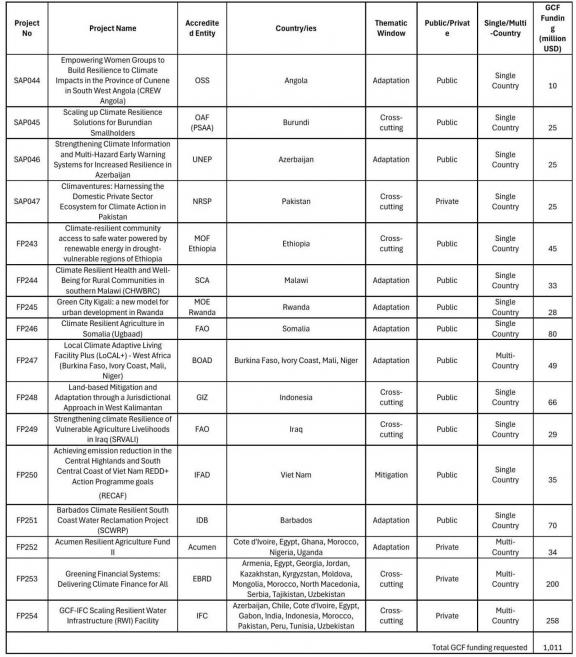B.40 Data Outlook: Empowering Climate Action through Evidence and Capacity Building
"The greatest value of a picture is when it forces us to notice what we never expected to see."
— John Tukey, American mathematician
As the crisp autumn breeze settles over Incheon, a sense of anticipation fills the air. The Green Climate Fund is preparing for its fortieth Board Meeting (B.40), taking place from October 21-24, 2024, at the IBS Tower and G-Tower. This is more than just another date on the calendar; it’s a pivotal moment where new strategies and initiatives will be forged to guide the Fund's future direction in the fight against climate change. Since joining the Independent Evaluation Unit’s DataLab in July, I've leveraged machine learning methods to address evaluation questions and uncover insights for real-world climate solutions. As we head into this crucial meeting, I feel inspired knowing that my work will support impactful climate initiatives championed by the GCF. In this blog, I invite you to explore key aspects of our provisional agenda and see how these strategies can drive meaningful change in the fight against climate change.
Spotlight of B.40
The provisional agenda covers a range of topics that will guide our path forward. On Monday, October 21st during B.40, the IEU will host a side event to provide first-hand experience and reporting from the ground. The event will offer an overview of the IEU’s Learning-Oriented Real-Time Impact Assessment programme portfolio, highlighting key results from the LORTA impact evaluation of FP069: Enhancing Adaptive Capacities of Coastal Communities, Especially Women, to Cope with Climate Change-Induced Salinity in Bangladesh.
The LORTA programme includes 26 projects funded by the GCF, each aiming at supporting and preparing for impact evaluations. The evaluation of FP069 specifically examines the project's causal effects on various aspects of household well-being and resilience to climate change, with a focus on women's empowerment, to determine its overall effectiveness.
An Overview of the Portfolio
At B.40, the Board will review a portfolio of projects, which aims to align with the GCF’s Updated Strategic Plan (USP) for 2024–2027. The portfolio includes 16 funding proposals requesting USD 1,011 million from the GCF, with the potential to leverage an additional USD 2,823.7 million through co-financing. These projects are set to reach 1,281 million beneficiaries and with the potential to reduce emissions by 3,095.9 MtCO₂. Notably, the first proposal under the Project-Specific Assessment Approach (PSAA) accreditation is expected to mark a significant milestone in broadening access to GCF.
Key highlights of the portfolio include:
- More Single-Country Focus and New Countries Reached: Of the 16 projects, 12 are single-country initiatives, representing a total funding of USD 470.1 million. These projects aim to address specific national priorities and challenges. The remaining 4 funding proposals address climate change through regional, multi-country initiatives, with a combined funding request of USD 540.9 million.
- First-Time Collaborations: Three projects represent inaugural engagements between the GCF and the respective countries—Angola, Azerbaijan, and Iraq. Additionally, FP246 marks Somalia's first single-country project with the Fund.
-
Alignment with Strategic Objectives: The USP focuses on balancing adaptation and mitigation funding while engaging the private sector. Interestingly, more than half of the projects target key result areas such as food security and energy access.
Table 1: Funding Proposals (FPs) to be considered at B.40
Adapted from: GCF/B.40/02. Consideration of funding proposals.
Most B.40 proposals focus on Africa and Asia, with several projects covering Latin America and the Caribbean, including countries such as Chile and Peru. In a related effort, IEU conducted an Evaluation of GCF’s Investments in Latin America highlights both successes and areas for growth.
Harnessing Climate Finance: GCF's Mixed Results in LAC Region
The LAC evaluation aims to assess whether GCF investments have promoted a paradigm shift in the LAC region, evaluate their relevance, identify emerging results, and pinpoint critical success factors for their effectiveness.
Our study highlights that LAC countries possess strong institutional capacities to implement transformative climate projects aligned with their NDCs. These countries demonstrate a clear intent to engage effectively with the GCF, expressing strong ownership of the institution by articulating their national priorities and seeking active involvement from NDAs. However, various barriers hinder the realization of their climate ambitions.
Despite the GCF’s ability to provide long-term capacity building, the lack of clarity in leveraging its value proposition leads to underutilization of available financing. High programming costs and complex access mechanisms further undermine the sense of ownership and limit the region’s ability to access GCF resources effectively.
REDD+ Results-Based Payment projects serve as notable examples of how emission reductions can be achieved alongside successful stakeholder engagement, indicating significant potential for replication in other initiatives. However, engagement with Indigenous Peoples has been inconsistent, and the implementation of GCF policies related to gender and Indigenous issues requires improvement to enhance inclusivity.
In summary, while the LAC region has the institutional capacity and willingness to engage with GCF to drive climate resilience, significant barriers—including complex access procedures, high costs, and inconsistent engagement with vulnerable groups—continue to limit the impact and reach of GCF investments.
Whistleblowing Insights: Strengthening Climate Action Among Accredited Entities
Building on the insights from LAC evaluation, it's crucial to also address the organizational aspects that support effective climate action. The Independent Evaluation of the Green Climate Fund's Approach to and Protection of Whistleblowers and Witnesses provided insights into how Accredited Entities understand and implement whistleblowing policies. While most AEs are familiar with their own organization's policies, there is some uncertainty regarding GCF's approach. We found a strong link between the support AEs received from the Independent Integrity Unit and their understanding of our policies.
Charting New Horizons: Navigating the Future of Climate Evaluation
As we conclude 2024, the IEU is set to submit two evaluations to the Board in time for B.41, including:
-
Indigenous Peoples Evaluation: This evaluation is being conducted at the request to assess the effectiveness of GCF’s Indigenous Peoples Policy. With a focus on how GCF-funded activities safeguard, engage, and share benefits with Indigenous communities. It will also examine how traditional knowledge is incorporated into climate solutions, building on lessons from previous evaluations.
-
Health, Well-being, Food, and Water Security Evaluation: Our ongoing evaluation will assess the extent to which the GCF’s approaches and investments in the HWFW result areas have been effective in contributing to the realization of its mandate and promoting paradigm shift towards low-emission and climate-resilient development pathways. For more details, see the approach paper.
"The greatest value of a picture is when it forces us to notice what we never expected to see."
— John Tukey
As we gather for B.40, Tukey's words resonate deeply with our mission at IEU. In our evaluations, much like in data science, we often uncover unexpected insights that challenge our assumptions about climate action. These revelations open new avenues for more effective interventions and policymaking.
Our rigorous analyses don't just produce reports; they illuminate paths forward in our battle against climate change. It's a privilege to contribute to this vital work, and I'm optimistic about the transformative impact we can achieve together as we apply these insights to create a more resilient, sustainable future.

